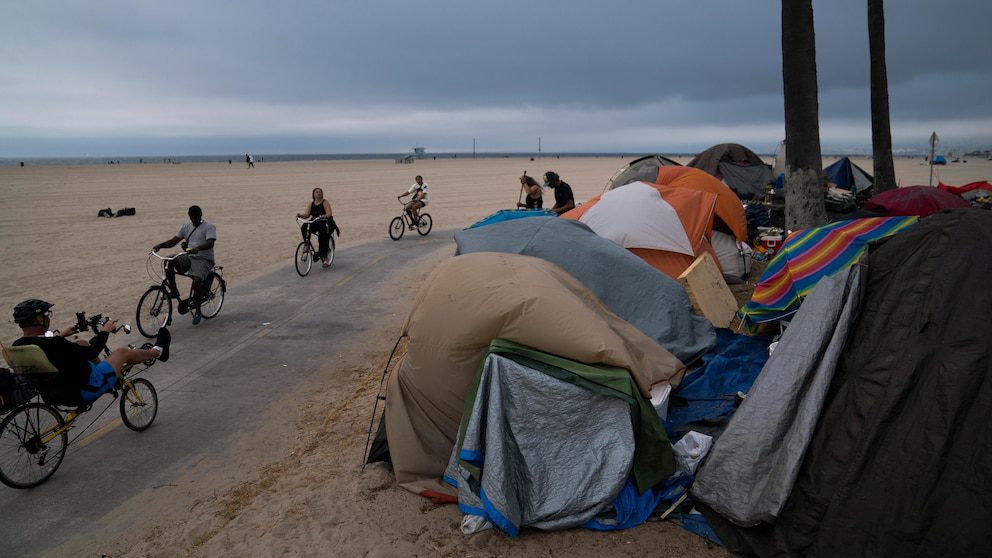

In California, a new mental health court program called “CARE Court” has been launched with high hopes and uncertainty. This alternative court process aims to quickly connect individuals with untreated schizophrenia and other psychotic disorders to housing and medical care, even without their consent.
Created by Governor Gavin Newsom in response to the state’s homelessness crisis, the program has received mixed reactions. Supporters believe it will provide much-needed help to those suffering from severe mental illnesses, while critics argue that it may coerce people into treatment and lack effectiveness.
As petitions begin to pour in, the eligibility criteria remain narrow, limited mainly to individuals with untreated schizophrenia and related disorders, leaving uncertainty about who the program can truly assist and how effective it will be.
Despite the challenges, advocates and officials are hopeful that CARE Court can make a positive impact and improve the lives of those affected by mental health issues in California.
Overview of the Mental Health Crisis in California
California is currently facing a severe mental health crisis, with a high prevalence of untreated schizophrenia and related disorders, and a significant impact of homelessness on mental health. The state also struggles with insufficient access to mental health services and support. These factors have contributed to a worsening situation for individuals in need of treatment and care.
Introduction to the CARE Court Program
In response to the mental health crisis, Governor Gavin Newsom created the CARE Court Program. The program aims to fast-track individuals with untreated schizophrenia and other psychotic disorders into housing and medical care.
It was designed to address the homelessness crisis in the state and has garnered support from lawmakers and families of individuals with severe mental illness.
The CARE Court Program offers potential benefits by providing timely treatment and housing for those suffering from untreated schizophrenia. It seeks to intervene before their condition worsens, offering hope to individuals and their families.
Controversies Surrounding the Program
Despite the hopeful intentions of the CARE Court Program, it has faced criticism and controversies. Critics express concerns about the effectiveness of the program and the potential coercion of individuals into treatment.
There is also a debate over the narrow eligibility criteria, which excludes individuals with severe depression, bipolar disorder, and addiction. These controversies raise questions about the program’s ability to provide comprehensive and inclusive care.
Eligibility Criteria and Process of the CARE Court Program
To qualify for the CARE Court Program, individuals need to meet certain requirements and have a diagnosis of the schizophrenia spectrum or other qualifying disorders. Severe depression, bipolar disorder, and addiction do not make individuals eligible for the program.
The county behavioral health agency evaluates eligibility, and individuals are appointed a lawyer and a support person of their choice.
If determined eligible, individuals are asked to work with the county on a voluntary plan that includes housing, medication, counseling, and other social services.
The agreement is in effect for up to a year, with the possibility of extension. This process ensures that individuals have a say in their treatment and are provided with the necessary support.
Concerns about Coercion and Forced Treatment
One of the main concerns raised by critics is the fear of vulnerable individuals being forced into treatment under the CARE Court Program.
While the program allows for the dismissal of proceedings if individuals decline to participate or follow the agreement, there is still apprehension about individuals who do not successfully complete the plan.
The potential consequences for non-compliance and the court’s limited power to compel individuals to engage in treatment raise concerns about coercion and individual autonomy.
Challenges and Limitations of the Program
The CARE Court Program faces various challenges and limitations. There is a shortage of case managers, in-patient treatment facilities, and supportive housing, which hampers the program’s effectiveness.
Despite the state’s allocation of funds for emergency shelters, there is a constant shortage of resources. Furthermore, community-based services are under-resourced and inaccessible, which can limit the program’s impact.
Some critics argue that the establishment of a new court system, rather than investing in existing services, may not be the most effective solution.
Allocation of Funds for Emergency Shelters and Treatment Facilities
While the state has allocated funds for emergency shelters, the ongoing shortage of case managers, appropriate in-patient treatment facilities, and supportive housing remains a challenge.
In San Francisco, for instance, only about 10% of the available beds are open for new people. The range of care provided in treatment beds varies from detox to step-down care for individuals leaving long-term care.
It is crucial to address these resource shortages to ensure the success of the CARE Court Program.
Criticism of the Program and Alternative Solutions
Critics of the CARE Court Program argue that more investment should be made in housing and existing mental health services instead of establishing a new court system. According to Disability Rights California, under-resourced community-based services are a key issue.
They highlight the importance of investing in accessible voluntary treatment options and ensuring that individuals have the support they need. It is essential to consider alternative solutions that address the broader systemic issues contributing to the mental health crisis in California.
Support from Mental Health Advocacy Organizations
Despite the criticisms, the CARE Court Program has received support from mental health advocacy organizations, such as the National Alliance on Mental Illness in California.
These organizations have long advocated for a way to order loved ones into treatment and view the program as a step in the right direction.
While they acknowledge the limitations and potential shortcomings, they emphasize the importance of not giving up and exploring other available resources.
Implementation of the CARE Court Program in Seven California Counties
The CARE Court Program was launched in seven California counties, including San Francisco, Orange, San Diego, Riverside, Stanislaus, Tuolumne, and Glenn.
These counties were selected as initial launch sites, aiming to gauge the program’s effectiveness and impact.
The projected number of eligible individuals in these counties ranges from approximately 1,800 to 3,100. Los Angeles County is set to launch its own program on December 1, with estimates suggesting a larger eligible population of 3,600 to 6,200.
The rest of the state has until December 2024 to establish its own mental health courts.
In conclusion, the implementation of the CARE Court Program offers both hope and uncertainty in addressing California’s mental health crisis.
While the program aims to fast-track treatment and housing for individuals with untreated schizophrenia, concerns about coercion, resource shortages, and limitations have raised valid criticisms.
It is crucial to address these challenges, allocate sufficient funds, and explore alternative solutions to ensure comprehensive and accessible mental health services for all Californians.
New West Valley Campus: Enhancing Mental Health Support for Children and Families
Bryan Health Doctor Emphasizes Treating Mental Health Equally to Physical Health







